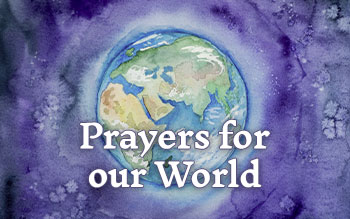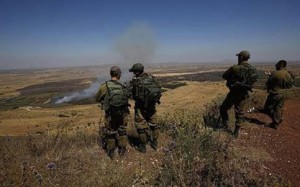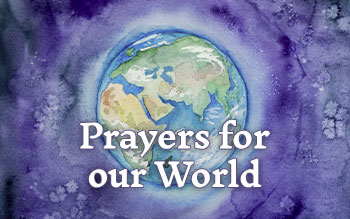
Super User
Lorem ipsum dolor sit amet, consectetur adipisicing elit, sed do eiusmod tempor incididunt ut labore et dolore magna aliqua. Ut enim ad minim veniam, quis nostrud exercitation ullamco laboris nisi ut aliquip ex ea commodo consequat. Duis aute irure dolor in reprehenderit in voluptate velit esse cillum dolore eu fugiat nulla pariatur
Sermon by imam demands 'liberation'
Muslim willing to sacrifice 'millions' of lives to retake 'Palestine'
“Palestine” must be retaken by Muslims even if it costs “millions” of lives.
That’s the opinion of an imam in Florida whose recent sermon on the topic was uncovered by the Middle East Media Research Institute.
The Oct. 12, 2018, message was from Hasan Sabri of the Islamic Center of South Florida in Pompano Beach.
He said a “believing Muslim’s” position is that Palestine is “Islamic waqf land that was occupied by force” – and that it should be liberated “even if this leads to the martyrdom of tens of millions of Muslims.”
MEMRI reported Sabri also said, “Allah wants each and every one of you to be a man with a cause … for which he lives and dies,” noting that the Palestinian cause “is being plotted against” with “the Deal of the Century.”
The research organization explained, “According to Pompano Beach elected officials, Sabri has recited invocations annually at Pompano Beach city meetings since 2005, and the ICOSF has had a peaceful, 25-year presence in the city, even serving as a polling station. In September 2017, Imam Sabri was a panelist at ‘Interfaith and Race Relations Peace and Acceptance Conference’ at Palm Beach State College in Lake Worth, Florida.”
But the building that is listed as the address of the ICOSF is owned by the North American Islamic Trust, which was named an unindicted co-conspirator in the largest terrorist financing case in America history. The case, U.S. v. Holy Land Foundation, resulted in convictions and imprisonment of several U.S.-based Hamas leaders.
Sabri said: “Take the Palestinian cause, for example. It is now being plotted against with a deal they call the ‘Deal of the Century.’ Why do they call it a ‘deal?’ Because whoever is involved in this treason is not a man of principles. These are peddlers, not men with a cause. All they want are positions and jobs. That is why for them, the cause is nothing but a deal, a matter of give and take. For them, it is nothing but a deal.”
He continued: “But what is the position of a believing Muslim about the Palestinian cause? That Palestine in its entirety is Islamic land, and there is no difference between what was occupied in 1948 and 1967. There is no difference between this village or that village, this city or that city. All of it is Islamic waqf land that was occupied by force. The responsibility for it lies with the entire Islamic nation, and the [Palestinians] should benefit from this land. If a land is occupied or plundered, it should be liberated from the occupiers and plunderers, even if this leads to the martyrdom of tens of millions of Muslims.”
He added, “This is the ruling, and there is no room for discussion or concessions.”
He also said: “[Atheists] always belong to minorities – national minorities, religious sects or minorities, and they have an agenda of destroying this Islamic nation, so they adopt atheism, not because it makes sense, but because it serves their approach. That is why you find most of these people, like I said, calling for goals that are opposite from the general goals of this nation. Our goal is to unite people, to unite Muslims. Their goal is to fragment Muslims even more. Wherever there is an opportunity to split a Muslim country into two, or three, or 10 parts, you will find that they are for it. What does that have to do with atheism? It has to do with an agenda. That’s all.”
Article printed from WND: http://www.wnd.com
URL to article: http://www.wnd.com/2018/11/muslim-willing-to-sacrifice-millions-of-lives-to-retake-palestine/
Pray for the peace of God to reign over the Middle East and especially over those radical Palestinians who want conquer the land of Israel by violence and even the cost of millions of lives.
Pray that many of them will come to Jesus, the Messiah, who alone can help them make sense out of their great sense of disenfranchisement.
UNPRECIDENTED ROCKET ATTACK, GOVERNMENTAL RESIGNATIONS, A GOVERNMENT POISED TO FALL—RECOVERED, BUT HOLDING ON BY A THREAD.
Hamas rained down almost 500 rockets on Southern Israel over a two and a half day period. Netanyahu sat 7 hours with his cabinet discussing whether or not to go to war.
Some of his cabinet felt there was no other choice except to go to war, as these last months of terrorism - sending fiery balloons over the border burning up farmland and forest areas, hordes of Palestinians trying to break through the border, etc., etc., etc. were bringing a living hell to the Israeli citizens in the south.
Others believed that because of the certain loss of many lives in the IDF that would occur, and the world's condemnation that would surely come, if Egypt could help put together a cease-fire agreement between Israel and Hamas, that would be the best direction.
Netanyahu chose the latter. Defense Minister Avigdor Lieberman was furious and resigned, taking his party of 7 Knesset seats with him. That left Netanyahu with 61 Knesset seats in his coalition. Netanyahu needs 61 out of 120 to lead the nation.
Naftali Bennett, who also felt the nation must go to war to defeat Hamas and give relief to the hundreds of thousands of Israelis in the south, told Netanyahu he wanted to take Lieberman's place as defense minister - or he would leave the government with his 8 Knesset seats. Netanyahu refused and Bennett says he is also leaving the government. That means elections are here.
It would seem logical that Netanyahu believes he can win a snap election, or he would not have let his government fall. He would have given Bennett the job.
Netanyahu is the most popular politician in Israel. The issue is that he has the entire group of ultra-Orthodox parties in his coalition, as he bends towards the religious. That means the Haredim (ultras) have tremendous power in Israel. They basically let Netanyahu do whatever he wishes to do, as long as he fills their coffers with shekels to support their men of whom the majority won't work or serve in the army. Aside from the harassment and persecution against Messianic Jews and Messianic congregations, the Haredim take far more than their share of finances, and give back little to Israeli society.
Yet, there is no other strong leader in any of the other parties that stands out who the Israeli public have faith that he or she can keep Israel in survival mode. Israel lives in the most dangerous neighborhood in the world.
So let us pray for God's will to be done in this upcoming election (2019).
Lord, we pray, in the awesome Name of Yeshua, that You will hear the prayers of Your people who have a personal relationship with You and Your Son, and give us relief from the Haredi persecutors. We pray that You will put together the coalition that You desire. Hear the words of our hearts, because we don't know who we should pray for or how to pray. But You have a plan. You have a plan to save all Israel and to bring revival to the nations of the world.
Use Your people here in Israel that love You. Give us opportunities and freedom to spread the Word of God more and more here in Israel.
SHIRA SORKO-RAM
PLEASE PRAY:
- That God will “redeem Israel out of all of his troubles” (Psalm 25:22). That a government will be put in place which is not out of alignment with those redemptive purposes!
- That while it is time for the present government to stand, it will stand; when it is time for it to be replaced, that it will fall.
- That with the resignation of Defense Minister Lieberman, a man or woman of courage, integrity and wisdom for that job will be chosen to take his place.
- That, as Shira mentions above, the ultra-Orthodox members of the present government (or one which may arise in its place), will not be allowed to work injustice nor take unfair advantage of their positions to coerce the government in a direction which is unrighteous and unjust.
- That God minister strongly to Prime Minister Netanyahu during this time. That he humble himself before his God, and allow himself to be led in ways which are truly aligned with God’s purposes for Israel this year. That he fulfills the length of days God has ordained for him to lead. That a godly, strong God-fearing leader be being nurtured to be raised up to take his place.
- That the warm, strong relationship between the governments of Israel and the United States which God has brought into place during this season would not be threatened or adversely effected by a shake-up in the Israeli government outside of God’s timing.
Martin and Norma Sarvis
Jerusalem
Your Peace Returns to You
Our last prayer topic was praying about finding a house were your peace would remain. In that house was a person of peace who would be key in moving forward the Good News in their family, with their friends and in their village. This prayer topic is about giving wisdom and freedom to the pioneer missionaries to move on to another village, town or city. Jesus tells His disciples,
"But when you enter a town and are not welcomed, go into its streets and say, ‘Even the dust of your town we wipe from our feet as a warning to you. Yet be sure of this: The kingdom of God has come near.’" Luke 10:10-11
Pray for pioneer missionaries to grow in knowing the Lord's peace
Pray for them to know when that peace has not returned to them as a sign to move on to the next village.
Pray for the disciples advancing the Gospel to have much wisdom in all of this.
Pray for cities to desire to repent.
Readers are invited to consider praying for a special project that will kick off on Monday, December 3rd. If you’d be willing to intercede for Bosnia for 31 days from December 3rd to January 3rd, please print the ATTACHED PDF and put the 31-day guide with your quiet time or Bible study materials.
Prayer is such a crucial component in the breakthrough work we are asking God to do.
On December 4th, we will once again begin using social media to creatively find spiritually seeking people in two Bosnian cities, Sarajevo & Tuzla. As you know, we tested this media approach last May and we were greatly encouraged by what God did in that 30-day test run. As our team begins to talk with people online, our goal is to move the conversation offline and meet them for face-to-face discipleship.
Please print the PDF on the link below and join us as we pray over the different facets of this initiative. There is great potential for Kingdom expansion!
Thankful for your partnership in prayer for Bosnia,
Pray4Bosnia Team
Email: This email address is being protected from spambots. You need JavaScript enabled to view it.
There is very serious and heavy fighting going on in many areas in the country. The defense minister Tariq Shah Bahrami said that battles are ongoing in at least ten provinces in the country and that the level of threats are beyond the capabilities of government. The battles are currently simultaneous going on especially in these provinces: Ghazni, Uruzgan, Faryab, Jawzjan, Sar-e-Pul, Kunduz, Badghis, Baghlan and some other areas.
On Wednesday Afghanistan’s Lower House of Parliament summoned the heads of the security institutions for the second time in a week on the situation in the country, particularly on Ghazni and Uruzgan provinces (where many Hazaras live).
The defense Minister made this sad statement: “To be honest, the level of threats is very high and the current facilities available to security and defence institutions is not enough to repel these threats. Afghanistan’s enemies are plotting to bring us to our knees. The enemies and supporters of enemies (neighbouring countries etc.) of the people of Afghanistan including the backers of terrorists have made their final plots to break our back.”
Another statement from the Minister of Interior Mr. Barmak shows their desperation: “the minister of defense and myself remain busy on the telephone until 2am and 3am (daily); we call here and there to this and that commander and get updates on the situations, and the commanders shout for help.”
The Taliban have attacked and conquered several areas of the minority Hazara Shia community and it is feared that they will commit many atrocities there. Often the Taliban killed Hazaras and even targeted their mosques and schools. Thousands of Hazaras are fleeing their villages and many have come also to the capital.
This situation is like a desperate cry, from the ministers and commanders on the field and the people that are suffering and we are wondering that how long the Army is able to push back the Taliban.
Please pray with us urgently and strongly
For the Lord to intervene in this very desperate and increasingly hopeless situation.
That the Taliban Forces would be defeated soon and that the government troops will be able to defend their country.
Especially now that they will be driven out of the Hazara areas and for protection of these vulnerable community.
For wisdom for the government and especially the Defence Ministry and Army and that they will receive all the help they need.
Thank you for standing in the gap for this embattled country. This has gone on for so long but we believe that as we earnestly pray for this country, once again we will see a breakthrough and a defeat of this that try to destroy this country.
We believe that even this situation will turn around as we pray!
Intercessors for Bolivia - “En la brecha por tuNacion” "In the gap for your Nation"
After Uprising Bolivia (Nov 29 – Dec 2, 2017) we have witnessed a spiritual revolution and a tsunami of convocations for fasting, praying and spiritual warfare training nationwide. In order to maximize this amazing momentum and pray to God for a National Strategic Prayer Plan, we called the leaders from the different prayer networks that have attended these convocations and trainings during this year for a national unified gathering : "En la Brecha por tuNación / In the gap for your Nation", the summit took place in the city of Cochabamba, Bolivia from November 8 to 10, 2018 .
This convocation gathered 230 prayer leaders from 28 different congregations and denominations representing six cities : Cochabamba, La Paz, Sucre, Oruro, Tarija and Quillacollo . We also had a delegation of 5 leaders from Calama, Chile.
After a time of waiting on God’s presence, and praying over the words that God spoke to many during this year and during the meeting a Prayer Plan for Bolivia was structured, believing that God will help the nation to enter in a new time of changes in all sectors of society.
Prayer strategies and Action plan:
- Continue with the 24/7 prayer covering in the 9 departments of Bolivia
- Prayer Vigils focused on the Unity of the Body of Christ
- Fasting and Prayer Journeys in the 9 departments of Bolivia
- National Altars of Worship and Intercession nationwide
- Training more people to become involved as intercessors of the nation.
- Identification of prayer efforts of distinct institutions to unite common points and bring solutions to Bolivia problems
- Simultaneous Intercession in some strategic points in several cities of Bolivia.
- Continue with the training of spiritual warfare and mapping of strongholds in the seven mountains of the Nation.
- Bolivia - Plan for Identificational Repentance and Forgiveness
- Prayer Guide indigenousgroups :Aymaras& Quechuas
- Cooperate with the UPRISING Latin American movement
Prayer points:
- Unity of the Body of Christ in Bolivia
- Uprising of a Kingdom Army of prophetic warriors, intercessors,worshipers , missionaries in Bolivia
- Pray for a spiritual and comprehensive reformation movement in Bolivia that includes the transformation of social, political, and economic spheres.
- Pray for understanding of the church and national leaders about the destiny of the nation.
- Pray for the reduction of the statistical indices of: violence, poverty, malnutrition, Illiteracy, infant mortality, demographic situation, fiscal and tributary problems, unemployment, social marginalization
- Pray for an increase of the statistical indices of: housing, education, labor, social welfare, infrastructure, communications
- Pray that Bolivia will experience and atmosphere of peace, security, political, social and religious freedom and prosperity.
- Pray that God releases a spirit of reconciliation, adoption, repentance, confession, and restitution among the Bolivians .
- Pray for the healing of the land.
- Pray that Bolivia will be part of the GO2020 initiative.
- Pray to reverse governmental laws supported by anthropologists, leftist politicians, Catholic priests that prohibit outreach of indigenous tribes: Aymaras& Quechuas.
- Pray for "Transformation of the Holy Spirit" in the 7 areas of Bolivian culture: government, family, education, church, arts and entertainment, economy, and the media.
Judith Yanira González
International Prayer Council
This email address is being protected from spambots. You need JavaScript enabled to view it.
Islam, Christianity, and Free Speech
We think of Europe as secular, progressive, and confidently post-religious. But try criticizing Islam.
Should governments be in the business of protecting people’s feelings? Most Americans, I think would say no. The European Court of Human Rights, however, thinks otherwise. In a historic move last month, the international court affirmed a conviction by a lower court in Vienna against a right-wing speaker who criticized the prophet Muhammad.
Identified only as “E.S.,” the woman, at a seminar in Vienna in 2009, described the founder of Islam as a “pedophile.” According to Islamic tradition, Muhammad was in his fifties when he married his third wife, Aisha, who was six years old at the time. Tradition also says Muhammad waited to consummate their union until the girl was nine.
For describing this relationship in direct though accurate terms, “E.S.” was reported to Austrian authorities, who charged her with “publicly disparaging religious doctrines,” which, believe it or not, is illegal in that country. The Austrian court convicted, describing her statement as “a malicious violation of the spirit of tolerance,” which was “capable of hurting the feelings” of Muslims, and of putting religious peace in Europe at risk.
After a lengthy appeal, the European Court of Human Rights reaffirmed this troubling verdict, ruling that the speaker’s remarks about Muhammad were not only “without factual basis,” but went “beyond the permissible limits of an objective debate,” thereby putting religious peace in jeopardy. So, peace is in jeopardy because Muhammad is critiqued, and not because of how his followers react to the critique?
Set aside for a moment the factual basis of Muhammad’s treatment of his nine-year-old child bride, and the fact that child brides are still shockingly common throughout the Muslim world. The rationale behind these rulings is genuinely scary for another reason.
This idea that speech should be illegal because it threatens “religious peace” is a capitulation to religious violence. Islamic extremists are well known for rioting and even killing whenever they believe someone has “insulted” the prophet Muhammad.
Exhibit A: Asia Bibi, the woman who was just acquitted by the Pakistani supreme court and taken off death row, where she sat for eight years after an alleged slight against the founder of Islam. Bibi now faces the very real possibility of retaliation or assassination by Pakistani radicals and remains trapped in the country.
What the European Court of Human Rights has essentially done is enact a blasphemy law like Pakistan’s, only in the West! Extremists who get violent over perceived insults have been granted veto power over citizens’ free speech. This, just a few years after the Charlie Hebdo massacre in which twelve people—including journalists—were gunned down in Paris over cartoons mocking (ironically!) the violent tendencies of Muhammad and many of his followers.
If guarantees to freedom of speech—which Europe has—do not include the right to say offensive things about religion, such guarantees are not worth the paper they’re written on. If anyone can shut someone else up simply by complaining of hurt feelings, your society is a dictatorship of the easily offended, not free. Caving to the threat of violence will ultimately embolden the violent, not appease them.
Protecting members of a minority religion from hurt feelings is unique to the West. Islamic extremists take advantage of Europe’s indulgence, demanding legal penalties against anyone who criticize Islam. They won’t, of course, ever return the favor. In countries like Saudi Arabia—the birthplace of Islam—a Muslim who converts to Christianity still, to this day, faces the death penalty.
Of course, religious tolerance and free speech arise historically from only one religion, and it isn’t the one founded by Muhammad. Those who think giving up freedom of speech will preserve peace in the long term aren’t insulting our religion. Just our intelligence.
God is raising up prayer all around the world - and He is clearly using children in prayer to make an impact on a scale never seen before.
The Operation World team have released a new prayer resource for the world aimed at informing and mobilizing families and children - Window on the World. Although it's full of colourful photos and interesting facts, the purpose of this resource is to nurture in kids a spirit of prayer and a missional vision for God's world.
There are over 100 two-page spreads sharing stories and prayer needs of various countries, people groups, and religions around the world. It rests on Operation World's foundations of solid research, relational networks with Christian leaders all over the world, and a Biblical worldview in step with the Spirit.
This new edition (the previous one being published in 2001) includes a number of new entries in keeping with the needs of our world in 2018 - nations like Syria and South Sudan, peoples like the Rohingya and Somalis, and issues like Third Culture Kids. But beware: using with children might lead to them becoming intercessors, missionaries, or both!
If you have any specific ideas about movements and countries that might be interesting in larger scale purchases, I would expect that we might be able to negotiate special prices, or possibly even local print runs in other countries. One of the design elements was the ability to publish in full colour or in black and white if necessary. We're very keen to see it translated into other languages and printed and distributed where those other languages are spoken, for prices in keeping with those local economies.
Window on the World was Edited by Jason Mandryk and Molly Wall.
Order Window on the World: https://www.ivpress.com/window-on-the-world
Contact Jason Mandryk / Operation World: http://www.operationworld.org/jasonow-team
Awesome new book on prayer and mission by an IPC leader
“Dr. Leslie Keegel’s new book is full of signs and wonders and reads like the book of Acts!”-
John Robb, IPC Chairman
|
|
|
A new “must read” book for praying people
Have you ever wondered just why the darkness in the world today seems to be getting darker, and what can be done about it?
This book sheds fresh light on this topic, and on the spiritual nature of this darkness. It shines the light of Scripture on the evil one and on the way in which so many have become bewitched. This is a clarion call to the church and individual Christians to get ready to do battle with the powers of darkness, and to shine Christ's light more powerfully.
Brian Mills writes out of many years of experience in international prayer ministry. He is a senior advisor in the International Prayer Council and is one of the leaders in the International Reconciliation movement. He has ministered in over 75 nations and authored nine books to date. He is also part of a global group that is seeking to understand more about the dark spiritual powers at work in the world.
"The most informative book for our times I’ve read for a long time."
Order ‘Window on the Darkness’ by Brian Mills in print or Kindle formats from
Amazon USA http://a.co/7zeqIKd
Amazon UK http://amzn.eu/0BMEL6l
Australia Calls the World to Pray
Sunrise Prayer Relay - New Year's Day 2019
Australia Christian prayer leaders invite their brothers and sisters in Christ, prayer groups, prayer networks and churches to join with them all over the world to pray at sunrise on New Year's Day 2018 at a public location such as a hill, lookout or landmark in your city or town. Already we have registrations from USA, South Africa, Namibia, Pakistan, Japan, United Kingdom, Fiji, Vanuatu, New Zealand, and Australia.
See 2019 short promo video: www.youtube.com/watch?feature=youtu.be&v=LSTHRAixKOQ
Warwick Marsh, coordinator for Australia’s National Day of Prayer & Fasting said, “David said in Psalm 108:2, “I will wake the dawn with my song.” During this time of prayer we want to focus on giving great praise to God. We also want to pray for revival and transformation, that God will bring healing to each of our nations: 2 Chronicles 7:14. Let us all pray for a great harvest of souls for the Lord Jesus Christ.”
Marsh continued, “In declaring Jesus Christ as Lord at this worldwide Sunrise Prayer Relay we are circling the globe with prayer, praise and worship and surrendering our lives to Jesus Christ for the glory of God. Psalms 113:3 says, “From the rising of the sun to the place where it sets, the name of the Lord is to be praised.” Use the prayer resources on the website and social media and register your location at: www.sunriseprayerrelay.org Our prayer is that with your help, this worldwide Prayer and Praise Relay will go viral.”
Pat Steele, a prayer and worship leader in Wollongong Australia, said, “We encourage you to pray the Lord's Prayer together aloud as the sun rises and make a declaration that Jesus Christ is Lord of your life, your family, your region and your nation. At your location we encourage you to include praise and worship, prayers, and scripture readings. We suggest 30 minutes, but you can pray for longer. You could even take communion, shine a torch, or light a candle. What you do for your sunrise celebration is up to you.”
Share photos and videos from your location on social media.
Use the hashtag: #sunriseprayerrelay
Website:www.sunriseprayerelay.org
Facebook:www.facebook.com/sunriseprayerrelay
Instagram:www.instagram.com/sunriseprayerrelay
Longer Video:www.youtube.com/watch?v=FybiSXxbl6Q
Contact: Warwick Marsh +61 418 225212 or Pat Steele by email: This email address is being protected from spambots. You need JavaScript enabled to view it.











